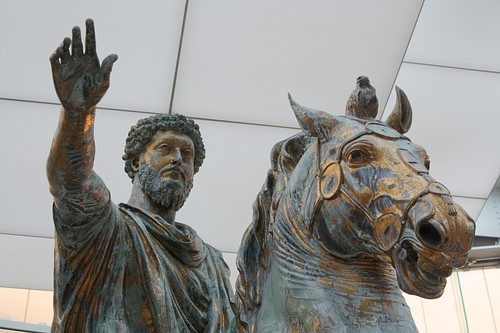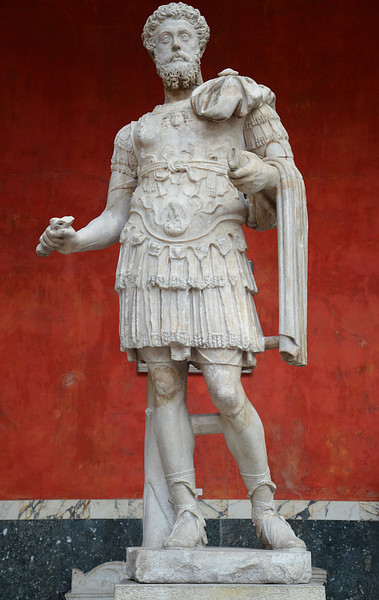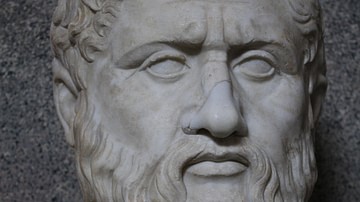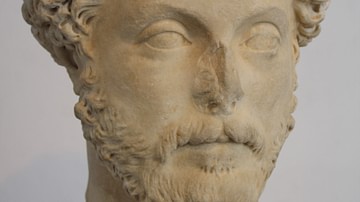Co-authored by Steven Umbrello and Tina Forsee
It is very common to hear in both academic circles, as well as more close-knit Stoic circles, Marcus Aurelius (121 – 180 CE) being referred to as the philosopher king. This is not an idea that is heavily under contention. Marcus Aurelius was definitely an amazing individual. He was adopted first by the Emperor Hadrian (76 – 138 CE) and then later by Antoninus Pius (86 – 161 CE). Marcus was educated by the best teachers in rhetoric, poetry, Greek, Latin, and of course, philosophy. The latter is the subject that he prized above all and it is that which had the greatest influence on the young man. The second century Roman historian Cassius Dio (155 – 235 CE) said of Marcus that:
In addition to possessing all the other virtues, he ruled better than any others who had ever been in any position of power. To be sure, he could not display many feats of physical prowess; yet he had developed his body from a very weak one to one capable of the greatest endurance…He himself, then, refrained from all offences and did nothing amiss whether voluntarily or involuntarily; but the offences of the others, particularly those of his wife, he tolerated, and neither inquired into them nor punished them. So long as a person did anything good, he would praise him and use him for the service in which he excelled, but to his other conduct he paid no attention; for he declared that it is impossible for one to create such men as one desires to have, and so it is fitting to employ those who are already in existence for whatever service each of them may be able to render to the State. And that his whole conduct was due to no pretense but to real excellence is clear; for although he lived fifty-eight years, ten months, and twenty-two days, of which time he had spent a considerable part as assistant to the first Antoninus [Pius], and had been emperor himself nineteen years and eleven days, yet from first to last he remained the same and did not change in the least. So truly was he a good man and devoid of all pretense. (Cas. Dio. Hist. Rom. 72. 34-35)
Marcus is most notably remembered for his surviving text now called The Meditations. It was the emperor's personal journal, which recounts all of his innermost thoughts. We see in The Meditations that Marcus used his knowledge of Stoic philosophy to modify his behavior; he was literally engaging in what we now know as cognitive-behavioral therapy. The strength and grace of his character gained him both the respect of the upper classes as well as the plebeians.
Marcus' goal was to become the best – most virtuous – person that he was able to become. He saw himself and the world that he lived in – tumultuous as it was – from a cosmic perspective. Seeing that he had a fundamental duty to other human beings, like Socrates, he didn't see himself as simply the Emperor of Rome, nor a Roman citizen, nor a Latin citizen, but rather a citizen of the world, a cosmopolitan in the truest sense.
Marcus' Stoicism was unique. Unlike his Stoic predecessors we see how the emperor was able to cope with the incredible difficulties that he was presented with. He was a sickly man, who had to confront constant political intrigue, war on the frontiers and difficult family affairs. In spite of all this he was still able to maintain his emotional control, to govern in an orderly and just manner and of course to cultivate his own virtue. Because of this Dio writes:
However, he did not meet with the good fortune that he deserved, for he was not strong in body and was involved in a multitude of troubles throughout practically his entire reign. But for my part, I admire him all the more for this very reason, that amid unusual and extraordinary difficulties he both survived himself and preserved the empire. (Cas. Dio. Hist. Rom. 72. 36)
Marcus Aurelius was emperor of all of Rome, a king to hundreds of thousands of people, as well as a philosopher. He was Rome's philosopher king for nineteen years. But the question is, was Marcus Aurelius a philosopher king only in the most literal sense, or was he a philosopher-king, as described by Plato in his magnum opus, The Republic? When people call Marcus the Philosopher king it is difficult to discern which of these two types of philosophical monarchs they are referring to. This article will hopefully shed some light on the difference as well as accurately describe Marcus' philosophic reign.
The Philosopher-King Paradox
Sceptical attitudes regarding the virtues of philosophy really haven't changed much in over two thousand years. Aristophanes ridiculed Socrates for having his head in the clouds, and Plato relates the story of Thales falling into a well while preoccupied with stargazing. Even then, philosophers were considered nothing more than a verbose bunch of obscurantists who didn't know how to tie their own shoelaces. Or, to be less anachronistic, they were obscurantists who didn't wear shoes, as if to flaunt their poverty and lack of materialistic concern.
When Plato insisted that the only way justice can exist is if a philosopher becomes a king, or vice versa, he was well aware of the public's negative perception of philosophy. Philosophy will teach children that it's okay to beat their parents. Philosophy will teach people that it's okay to murder because truth is relative. Philosophy will turn its practitioners against traditional religion. Philosophers will make you pay a hefty fee only to teach you how to make the weaker argument defeat the stronger. Philosophy will make you a useless citizen.
The idea of a philosopher king was as repulsive then as it is now. Philosopher kings? What better rhetorical breeding grounds for tyrannical dictators like Hitler and Stalin? Few take the idea seriously. Even amongst many philosophers, the idea is repugnant.
Yet, Plato wasn't being facetious. Paradoxical, bold, maybe even in-your-face, but not facetious. For him, the practice of philosophy was something quite different from what was being called philosophy in his time. The true philosopher, we must remember, is an ideal. This person must have knowledge of the Good. In this case there is no fallibility, no human weakness to account for. If such a person were to exist, Plato predicted that no one would acknowledge the philosopher's expertise. Bringing about a truly just society is nearly impossible.
The true philosopher is likened to a captain of a ship who is viewed by his crew as a useless stargazer. An apt metaphor which plays off of the story of Thales. Plato handles the metaphor with an intentional equivocation: Navigation of course depends on stargazing, although in the captain's case there's presumably no metaphysical inquiries involved. Here, we see stargazing as techne, craftsmanship, a practical art. The captain's knowledge of the stars is like the doctor's knowledge of health, or the computer geek's knowledge of how to get that virus out of your computer. In these cases, we turn to experts for help because we know we don't know. In the ship metaphor, we the readers see the folly of the crew's dismissal of the captain's knowledge.
The point is, Plato's ideal philosopher king is an expert in statesmanship who actually knows how to bring about justice. If we could know that such a person exists, we'd automatically turn to this philosopher for help. There's the rub. We don't know. And how can we? In each case the proof is in the pudding.
Herein lies the paradox of the philosopher king: If everyone were experts in justice, we could recognize a philosopher king, but then we wouldn't need one. Since we're not experts, how do we know who among us is a philosopher king? Without knowledge of what's good (in Plato, the Good) we can't say. Do philosophers make good rulers? The most we can do is look to the past for an approximation, obliquely.

The Proof is in his Power
Treachery, plague and war; despite all of these Marcus was able to summon the will to hold the delicate balance of power in check and preserve the empire. He maintained what is known as Rome's Silver Age and did what he could to make the lives of his citizenry as prosperous and stable as possible. It was said of Marcus' character that “he was austere, but not hardened, modest but not timid and serious, but not grim.” (Historia Augusta. 4. 5) His interactions with people of all strata were described in this way:
Indeed, toward the people he behaved no differently than one behaves under a free state. He was in all ways remarkably moderate, in deterring people from evil and encouraging them to good, generous in rewarding, lenient in pardoning and as such he made the bad good and good very good – even suffering with restraint the criticism of not a few. (Historia Augusta. 12. 1)
As a Stoic, Marcus had an unwavering sense of duty to those beneath him in the hierarchy; he was a man of service and would do all that was necessary to see his purpose fulfilled. When the Germanic tribes began raiding the northern frontier borders, Marcus, rather than increase taxes on the public to fund the campaign, sold off all his imperial possessions to pay for the endeavor. He saw such an act not only as a necessary action, but one that was called for by his duty in being in such a position of wealth and power.
When it came to distributing punishment in the judicial system, Marcus' philosophical discipline also dictated his decisions. The Historia Augustus says of Marcus that:
It was normal for [Marcus] to penalize all crimes with lighter sentences than were generally imposed by the laws, but at times, toward those who were obviously guilty of serious offences he remained unbending… He meticulously observed justice, furthermore, even in this contact with captured foes. He settled countless foreigners on Roman land. (Hist. Aug. 24. 1)
The Emperor lived his entire life as a true philosopher, he spoke like a philosopher and he ruled like a philosopher.
For Marcus' own serenity was so great, that he never changed his expression (either in grief or in joy) being devoted to the Stoic philosophy, which he had learned from the very best teachers and had acquired himself from every source. (Hist. Aug. 16. 3)
He was generous, lenient and embodied many modern notions of republicanism, while at the same time sat in the highest seat of imperial power.
A Philosophical Democracy
We value democracy because we have the power to push a tyrant off the throne. Democracy's realistic in human assessment: there will be as many if not more fraudulent philosopher kings as there are sheisty auto mechanics. Democracy lets us call them out, warn the others, put these impostors in their place. Freedom of speech is a crucial safeguard.
However, a democratic system relies on the assumption that we all know what's good for us, that the good can be brought about through our collective knowledge. Bad things will happen, but change is always on the horizon. “Change” is something we've become enamored with, but this political slogan relies on presumed general discontent and the assumption that change will be for the better.
But are we collectively experts in virtue and justice? If we're all driving the ship, where is it going? The winds push in one direction, then another. Education is of utmost importance in a democracy, but education is itself another element battered by the storm of opinions. There will be no end to the troubles of states, or of humanity itself, till philosophers become kings in this world, or till those we now call kings and rulers really and truly become philosophers, and political power and philosophy thus come into the same hands.
Democracy is a word that now has positive connotations, and for good reasons. But education was not meant to be democratized. A philosophical education would teach us at the very minimum how to distinguish empty rhetoric from sound arguments, how to spot informal fallacies. This is necessary when choosing our “captains,” and ought to be included in public education.

The Boy who would become a Philosopher
Marcus Aurelius was a true warrior, he did not dance with his life; instead it was a constant boxing match. He did his best to keep his chin up and inspire those around him to become better than they were.
He studied philosophy intensely, even when he was still a boy. When he was twelve years old he embraced the dress of a philosopher, and later, the endurance – studying in a Greek cloak and sleeping on the ground. However, (with some difficulty) his mother persuaded him to sleep on a couch spread with skins. (Historia Augusta. 2. 6. )
In his final days we can see how even the army, whom he led into battle in the north, responded when they heard of his illness that would eventually take his life: “The army, when they heard of his illness, cried noisily, for they loved him alone.” (Historia Augusta. 28. 1) Even on his deathbed Marcus was unrelenting in his practice of Stoic virtue. Acting with indifference to inevitable demise, he said to the loved ones watching him, “do not cry for me, but think instead of the sickness and death of so many others.”(Historia Augusta. 28. 1)
The empire lived in synchronicity with Marcus; the empire endured as long and as well as he did. His death marked the end of an era and the beginning of the empire's fall. Cassius Dio writes of the death of Marcus that, “… our history now descends from a kingdom of gold to one of iron and rust.”(Cassius Dio, Hist. Rom. 72. 36)
And now we finally come to the question addressed at the beginning of this article, was Marcus Aurelius Plato's philosopher-king?
The concept of Plato's Kallipolis and its ruling philosopher-king is deeply nuanced and embodies many strict notions such as the harmonization of the cardinal virtues of “wisdom, courage, self-discipline, and morality” (Plato, Republic 427e) as well as knowledge of the Good. Marcus may or may not fit the description. Marcus' life and reign would definitely have been a consolation to Plato in that a philosopher can be a king, and that such a ruler could live a philosophical lifestyle, and impart that wisdom on his public administration. Marcus, although perhaps not the philosopher-king of Plato's Kallipolis, was still a philosopher king in the most literal sense.
Of course the Stoic notion of the Sage and the Platonic notion of the harmonized soul differ, however they both agree that the key to a just society is a ruler who embodies their respective ideas of harmonized virtue. Edward Gibbon in his magnum opus, The Decline and Fall of the Roman Empire, saw the magnificence of the Antonine rule and stated:
If a man were called upon to fix that period in the history of the world during which the condition of the human race was most happy and prosperous, he would without hesitation name that which elapsed from the accession of Nerva to the death of Marcus Aurelius. The united reigns of the five emperors of the era are possibly the only period in history in which the happiness of a great people was the sole object of government. The forms of the civil administration were carefully preserved by Nerva, Trajan, Hadrian and the Antonines, who delighted in the image of liberty, and were pleased with considering themselves as the accountable ministers of the laws. Such princes deserved the honour of restoring the republic, had the Romans of their days been capable of enjoying a rational freedom.” (Gibbon, 1909, p. 78)
Marcus may not be Plato's philosopher-king but he was undoubtedly the philosopher-emperor.
Addendum
Many of the quotes used to justify the points made in this paper regarding the life, rule and character of Marcus Aurelius were taken from the ancient text known as the Historia Augusta, which is notoriously debated as being unreliable in many parts. Nonetheless, regardless of its validity, many of texts which mention his life, including Cassius Dio coherently match the character that the HA portrays of Marcus Aurelius.






